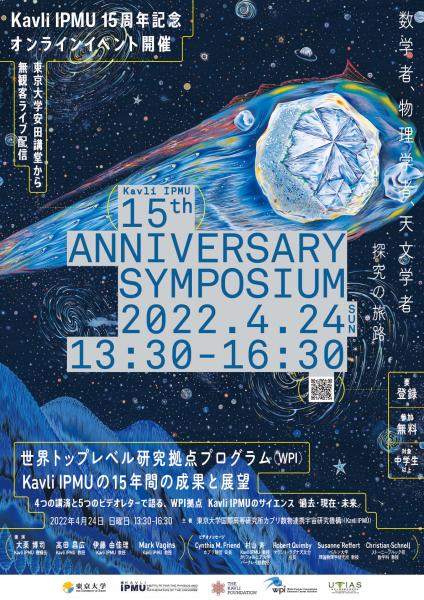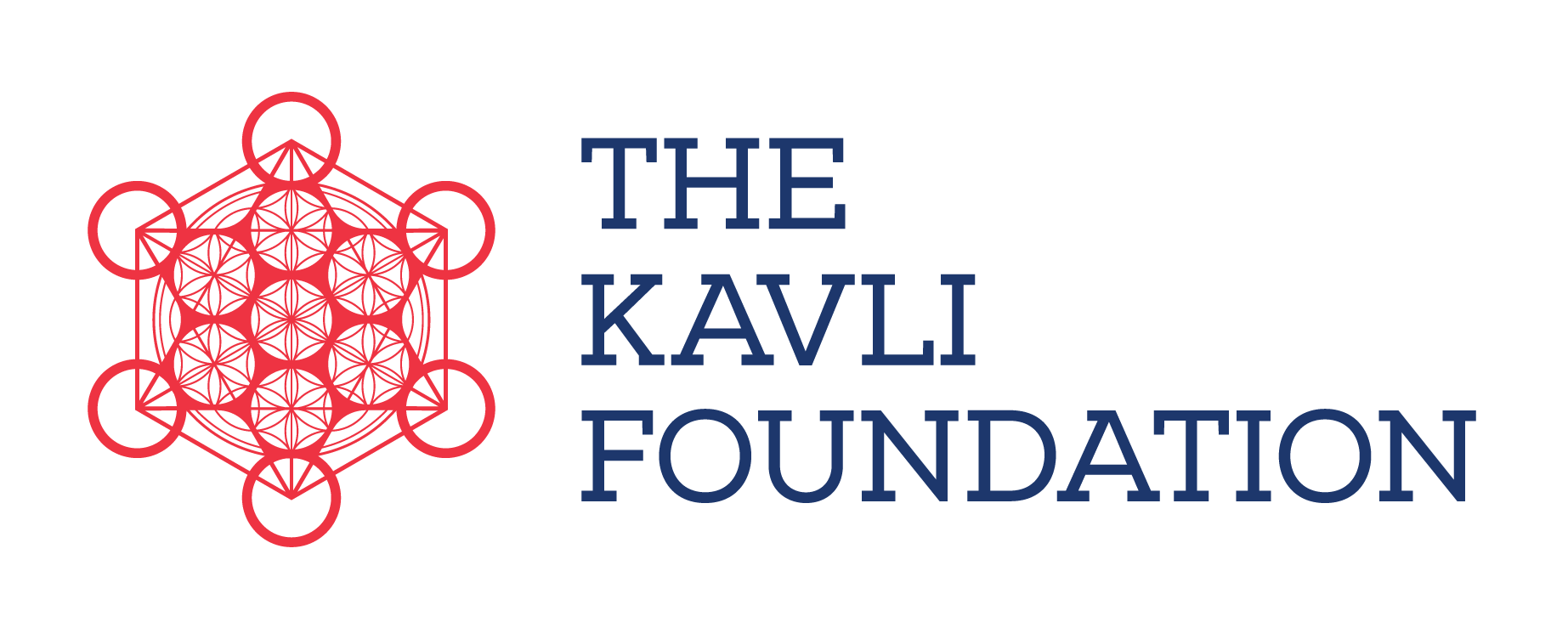March 8, 2022
Kavli Institute for the Physics and Mathematics of the Universe (Kavli IPMU)
On 24 April 2022 (Sun), the Kavli IPMU will host it's 15th anniversary symposium titled, "World Premier International Research Center Initiative (WPI) Kavli IPMU's 15 years of Science and Future Prospects: Solving the Mystery of the Universe with a Mathematician, Physicist, and Astronomer". There will be four lectures, and five video messages from various people reflecting on the past, present and future of our institute. This event will be online, but pre-registration is required. Registrations close APRIL 22. We look forward to seeing you there.
 Program
Program
Opening Introduction
13:30-13:45
- Teruo Fujii (President, the University of Tokyo)
- Takakuni Ikeda (Director-General, Research Promotion Bureau, Ministry of Education, Culture, Sports, Science and Technology)
- Akira Ukawa (Program Director, World Premier International Research Center Initiative)
Lecture
13:45-14:30
Hirosi Ooguri (Director, Kavli IPMU)
Video Messages
14:30-14:40
-
Cynthia M. Friend (President, The Kavli Foundation)
-
Hitoshi Murayama (Founding Director, Kavli IPMU)
Lecture 1
14:40-16:10
Exploring the Dark Universe with the Subaru Telescope
Masahiro Takada (Professor, Kavli IPMU)
Since the beginning of Kavli IPMU, I have been working to uncover the identity of dark matter and dark energy in our universe through an international collaboration project using the 8.2m Subaru Telescope in Hawaii. Progress has leaped forward in the past 15 years, and we were able to produce Observation Cosmology, a research field aimed at studying the vast universe itself. Thanks to gravitational lenses predicted by Einstein, we have managed to study the distribution of dark matter even though we cannot directly observe it with light. As the Kavli IPMU grew, we have been able to make a map of dark matter in the universe, and study primordial black holes, a candidate for dark matter. My talk will be an overview of my research that has taken place at Kavli IPMU these past 15 years.
Speaker profile: After receiving his PhD from Tohoku University in 2001, Takada has held research posts as a Japan Society for the Promotion of Science Fellow at Tohoku University and the National Astronomical Observatory of Japan, and Post-Doctoral Fellow at the University of Pennsylvania. In 2004 he returned to Japan as Assistant Professor at Tohoku University, before joining the Institute for the Physics and Mathematics of the Universe in 2008 (re-named Kavli Institute for the Physics and Mathematics of the Universe in 2012) as Project Associate Professor, before becoming a Principal Investigator since 2017. His research field is observational cosmology.
* Support: This talk will introduce and latest work from Transformative Research Areas Project 20H05850: "What is dark matter? - Comprehensive study of the huge discovery space in dark matter"
Lecture 2
The Mystery of Singularities
Yukari Ito (Professor, Kavli IPMU)
A singularity is a point or curve on a surface. Something that is different from what is around it. The corners that appear when folding origami are examples of singularities. When you ask a physicist to define a singularity, they seem to think of the Big Bang and black holes. There are also singularities in engineering and medicine. In mathematics, a singularity is a special point that is difficult to use in a general sense. However, there are mathematicians who research the shape of singularities, or try to think of ways to resolve singularities. In my talk, I will introduce the beautiful examples of mathematics that have been discovered thanks to studying singularities and resolution of singularities. I will also look at how they tie in with physics.
Speaker profile: After finishing her PhD in Mathematical Sciences at the University of Tokyo, Ito went on to become a Research Assistant at Tokyo Metropolitan University, then Associate Professor at Nagoya University. She joined the Kavli Institute for the Physics and Mathematics of the Universe in 2017 as Professor. Her research field is mathematics, particularly algebraic geometry. She currently serves as a member of the Science Council of Japan, and has published several popular science books about mathematics.
Lecture 3
Supernova Neutrinos Without the Annoying Wait
Mark Vagins (Professor, Kavli IPMU)
Regarding the detection of supernova neutrinos, the waiting is the hardest part. The last, and so far only, observed supernova neutrinos came from the SN1987A explosion thirty-five years ago, and we've been hoping to see some more ever since. Now, a groundbreaking Kavli IPMU innovation will allow the famous Super-Kamiokande detector to continuously record neutrinos from distant, ancient supernova explosions scattered across the known universe. As a result, we will no longer have to wait!
Speaker profile: Originally from the United States, Prof. Mark Vagins received his physics education at Caltech and Yale University, and joined the Super-Kamiokande project, then under construction, in 1994. An expert in neutrinos and particle detector technology, he was the first foreign professor hired by IPMU after its founding in 2007.
Video Messages
16:10-16:20
-
Robert Quimby (Director, Mount Laguna Observatory)
-
Susanne Reffert (Professor, Institute for Theoretical Physics, Bern University)
-
Christian Schnell (Professor of Mathematics, Stony Brook University)
Closing Remarks
16:20-16:25
Hiroaki Aihara (Executive Vice President, the University of Tokyo)
*Note: Simultaneous interpretation from Japanese into English will be available throughout this program.
Summary
Time & Date: 13:30 - 16:30, 24 April (Sun), 2022
Venue: Live stream from Yasuda Auditorium, the University of Tokyo (no audience on site)
Difficulty level: Junior high school and above
Admission: Free
Host: Kavli Institute for the Physics and Mathematics of the Universe (Kavli IPMU)
To register for this event: Fill out this form by 22 April.
Enquiries: +81-04-7136-5981 / Email: koukai-kouza_at_ipmu.jp (Kavli IPMU Press office)
* please change _at_ to @






